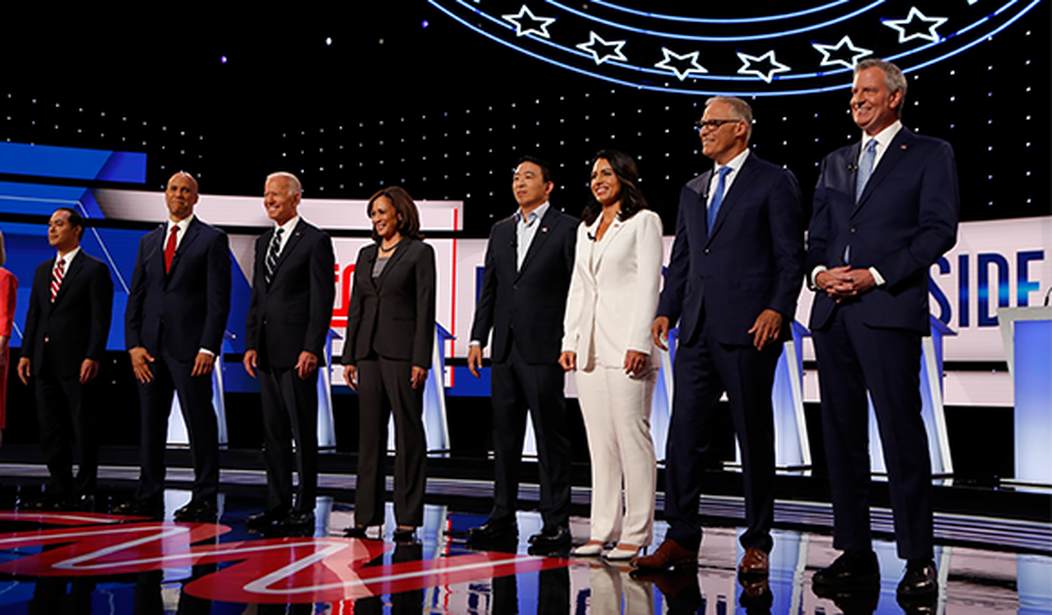"No candidate received a polling bump as a result of the Detroit debates," writes Morning Consult analyst Anthony Patterson this week. That's a big disappointment for the dozen or more candidates struggling to make the Democrats' 2 percent cutoffs for further debate appearances, as well as for the pundits weary after six or so hours of debates and post-debate interviews.
Actually, it appears that Kamala Harris sunk a bit from her numbers after her school busing hit on Joe Biden in the Miami debate, and Elizabeth Warren's post-Detroit numbers are up a bit. In the most recent national polls, Biden is still in first place; Bernie Sanders and Warren are competitive for second; and Harris follows in high single digits, with Pete Buttigieg trailing behind.
What may be more interesting is how the polling differs from previous patterns. In 2016 primaries, white non-college graduates in communities with low social connectedness thronged to Donald Trump, while college graduates shunned him. That was a new pattern, I wrote in a March 2016 Washington Examiner column, and one predictive of how Trump would switch 100 or so electoral votes and win the presidency in November.
So let's look at how different segments of Democratic primary voters are responding to candidates this year.
Start with white college graduates, once a negligible splinter, now about 40 percent of them, according to exit polls. They're also the Democrats' leftmost voters on issues, from impeachment to racial reparations. A post-Detroit Quinnipiac poll with subgroup results shows Warren leading Biden 28 to 25 percent in this group, well ahead of Sanders (11 percent) and Harris, who is tied with Buttigieg (8 percent). White college grads are among the best groups for the articulate Harvard Law professor and the articulate Notre Dame professor's son.
Recommended
Black voters, solidly Democratic for a half-century, are about 25 percent of Democratic primary voters. MSNBC's Steve Kornacki's useful summary of their primary voting history shows how they've voted near-unanimously or heavily for one candidate -- Jesse Jackson in the 1980s, and Bill Clinton, John Kerry, Barack Obama and Hillary Clinton since. Note that each of these since Jackson has won the party's nomination. Big margins among one-quarter of an electorate can overcome small margins among the other three-quarters.
Black Democrats' clear choice now is Biden (47 percent in Quinnipiac), with Sanders (16 percent) a very distant second, while the white college grads' favorite, Warren, lags behind (8 percent). Quinnipiac has black candidates Harris and Booker receiving 1 and zero percent from blacks; they do better in other polls but struggle to hit double digits.
Their left-wing issue stances may not help. Echelon Insights polling shows 13 percent fewer nonwhite Democrats identifying as liberal than white Democrats. That suggests that most blacks may not switch to the strident liberal Booker or flexible liberal Harris, as black voters in early 2008 switched to Barack Obama after he showed he could win the Iowa caucuses.
Some Democratic constituencies seem to have an active aversion to certain candidates. Black voters seem to be repelled by Pete Buttigieg; he gets only 1 percent from them in Quinnipiac and has been getting zero percent in other polls. Black voters have been the Democratic constituency least supportive of same-sex marriage.
And very high-income voters, heavily Democratic these days, nonetheless seem to have little use for Bernie Sanders. Among high-income ($100,000-plus) Democrats polled in Quinnipiac, only 6 percent chose the socialist and admirer of 70 percent income tax rates. Similarly, in 2016, he lost the highest-income suburbs -- Greenwich, Connecticut; Winnetka, Illinois; Wellesley, Massachusetts; Bloomfield Hills, Michigan -- to Hillary Clinton by roughly 2-1 margins.
Campaign finance reports show several candidates with home-state fundraising bases but, surprisingly, few with strong home-state polling. Californians cast 17 percent of Democratic primary voters last time, but the RealClearPolitics average of recent (June/July) California polls show Kamala Harris, winner of three California statewide elections, with just 20 percent.
Even more woeful are the hometown showings of the three candidates from metropolitan New York, though that state and New Jersey account for 9 percent of Democratic primary votes. But few are going to Cory Booker, Kirsten Gillibrand or Bill de Blasio. As for Massachusetts, RealClearPolitics has Elizabeth Warren in third place at 12 percent and, in next-door New Hampshire, in second place with 17 percent.
So will relatively moderate blacks (a majority in South Carolina) stick with Barack Obama's vice president? Will white college grads (dominant in New Hampshire) coalesce around someone with a radical platform? Or will the dwindling and less radical white non-college group (still big in Iowa) take over? We'll have answers in 18 months.

























Join the conversation as a VIP Member